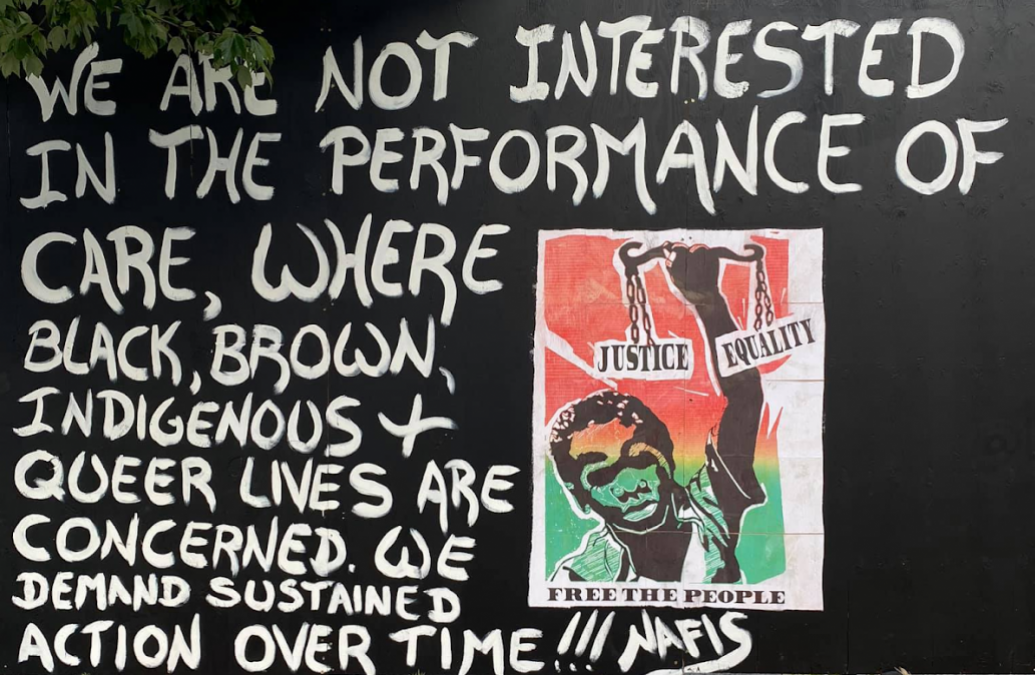Building on Anti-Racist Work in Our Community

Photo by Marco McWilliams, Program Coordinator;
Mural by Nafis M. White
As thousands of individuals, governments, and corporations denounce the racist actions of police and institutions around the world, at the Swearer Center, we are looking to our local community partners to see how they are addressing racism within their organizations and communities to both honor the work we do, and to help inform how we do our own work. At a recent meeting of the Swearer Center’s Community Advisory Board, we heard from sitting members about their organization's next action steps, which helped us think about the work we want to be doing in our own organization. Some of the highlights include:
PROVIDENCE PUBLIC LIBRARY
For some, the necessary work starts with learning the history of racial dynamics in the United States. The Providence Public Library has compiled resources on local racial and social justice organizations to help further this education both internally and externally. They’ve also created a reading list on the Black experience in America with forty-six books– one for every year George Floyd lived.
COMMUNITY ACTION PARTNERSHIP OF PROVIDENCE
At Community Action Partnership of Providence (CAPP), Deputy Director Norma Gonzalez sees how COVID-19 has disproportionately affected Brown and Black community members. In order to combat this imbalance, the human services organization will utilize a grant from the Rhode Island Foundation’s Black Philanthropy Bannister Fund to support the black community during COVID-19.
Leveraging this grant with other resources, CAPP will also research the systemic issues the Black community is facing during COVID-19 through a community-based participatory research model, Photo Voice. Researchers of color will propose projects aimed at understanding specific inequities in their respective community. “The final research question(s) they will explore is being developed and will be finalized with the participants themselves. We do know that we want to explore why communities of color and those living in poverty are seeing a disproportionate increase in infection rates due to COVID-19,” says Executive Director Rilwan Feyisitan.
HOUSE OF HOPE COMMUNITY DEVELOPMENT CORPORATION
At House of Hope CDC, Michelle Duso, an advocate for homeless youth, finds inspiration in her youth leaders. Several of these activists have been at the forefront of the Juneteenth and education rallies here in Providence. “Their identity changed from those receiving support, to becoming changemakers in their communities,” says Michelle.
Duso hopes to see more concrete commitments in many organizations’ statements in the future. For those in a non-profit organization, she urges senior leaders to look into their own staff policies to build a more equitable community. She asks, “If you are providing a direct service like housing, are you paying your own staff enough to find housing in your community?”
SWEARER CENTER
On June 3, 2020, the Swearer Center released a Statement in Response to Systemic Racial Injustice, noting, "community engagement cannot exist without anti-racism at its core." Since then, the Swearer Center staff has worked with students and community partners to develop a compilation of resources, Anti-Racist Community Engagement in Rhode Island, which is designed to be a living document, welcoming of edits and input.
However, we know that statements and resource documents are not close to enough. At the Swearer Center, we have been reflecting on how we invest in anti-racist work and practices individually and collectively, and where we need to do better. Since 2019, staff has met monthly in two separate identity caucuses to reflect about how each individual’s multiple identities come into play at work and in the world. Recognizing that white staff members have specific roles in naming, disrupting, and undoing the systems of oppression that unjustly impact people of color, the White Staff Caucus reflects on how each individual benefits from – and contributes to – institutional and systemic forces, while holding themselves and each other accountable to the work. Those in the Staff of Color Caucus, similarly, work to understand how their intersectional identities influence how they approach the world, and also take time to be in community with each other.
Conversations about this work are also happening at the Assistant/Associate Directors and Directors meetings, as well as with the full staff, though participation is always opt-in. Our Departmental Diversity and Inclusion Action Plan (DDIAP) Committee is working to provide updates on our DDIAP progress over the last year, and to develop goals and action steps for the coming year, which will be shared on our website as appropriate. By setting aside time in the work day for these meetings and conversations, the Swearer Center hopes to incorporate anti-racist practices within the organization.
COMMUNITY ADVISORY BOARD RECOMMENDATIONS
For community engagement centers who are building on or even beginning their own anti-racism work, our Community Advisory Board’s unanimous advice is this: “move towards vulnerability.” Other suggestions they shared with us include:
-
Highlight past pitfalls and struggles (acknowledge harm) while providing information;
-
Practice towards change;
-
Give meaningful and consistent updates;
-
Remember that a statement without action is merely performative; and
-
Make complete transparency a value of your organization.
“You have to act as if it were possible to radically transform the world. And you have to do it all the time.” Angela Davis
